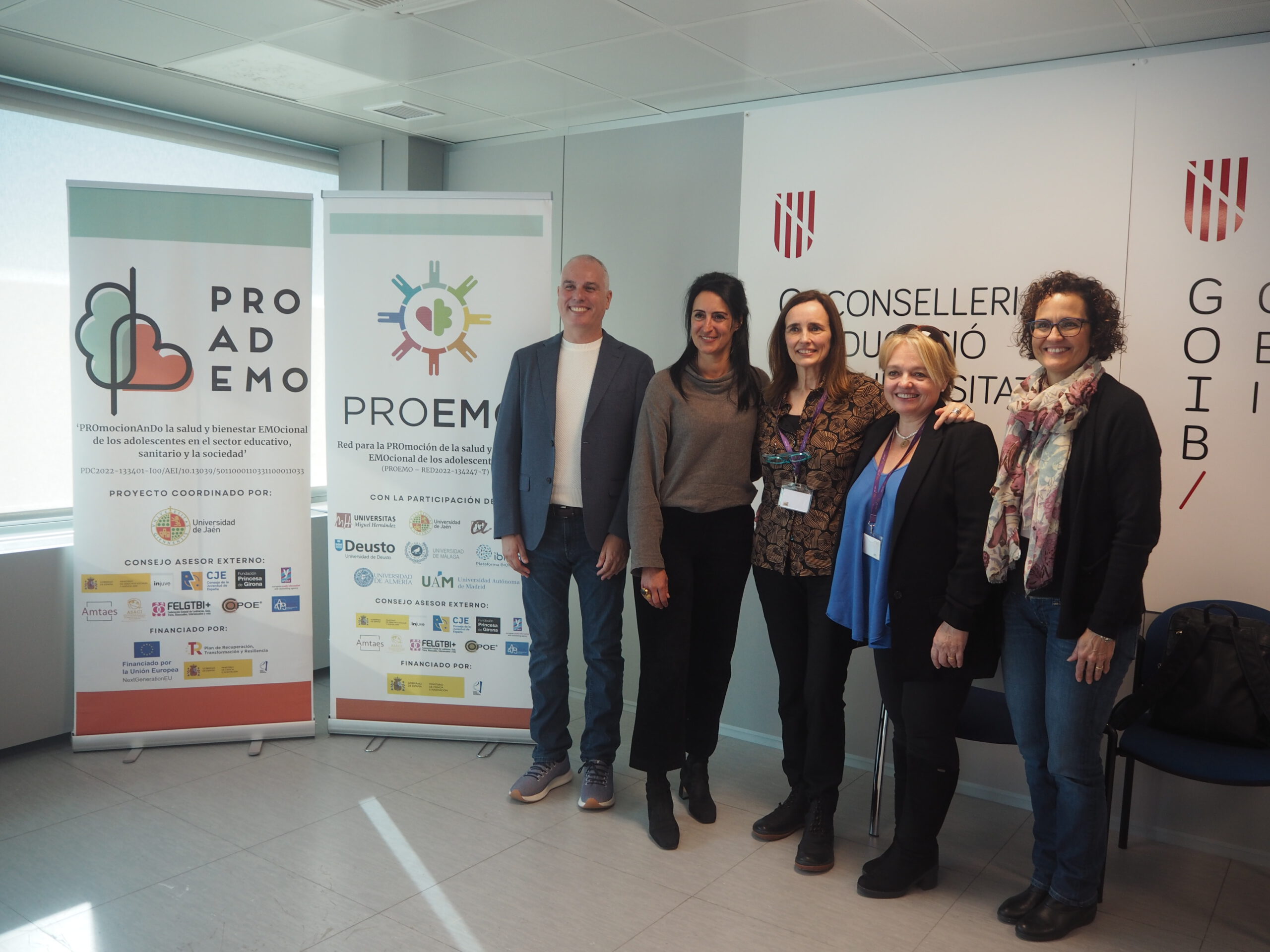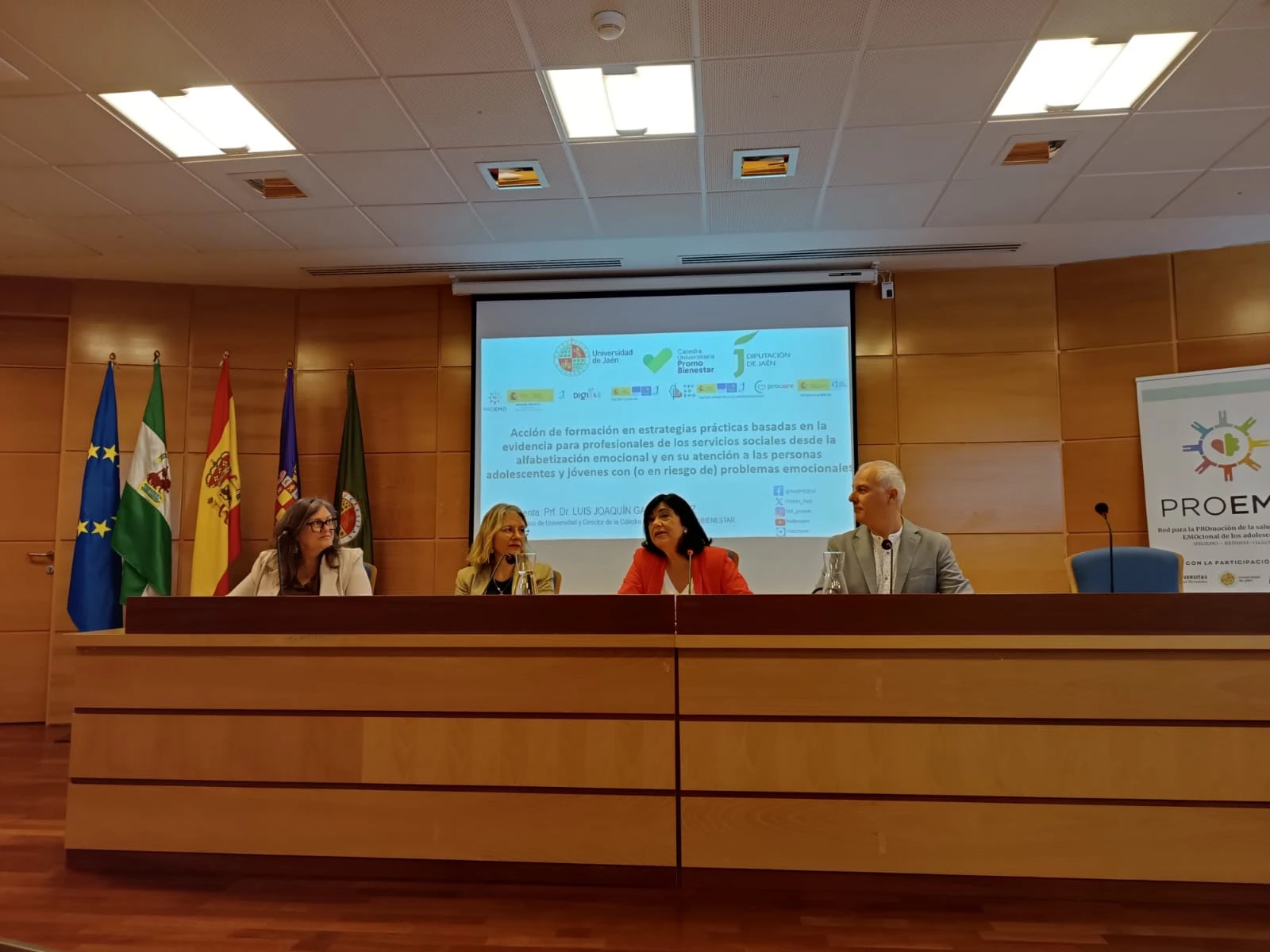The program, led by researchers from the University of Jaén, has implemented the PROCARE protocol to evaluate the emotional state of more than a thousand adolescents from 43 schools and support those who needed it, thanks to an agreement with the Balearic Government’s Department of Education and Professional Training.
23/11/2023.- The PROCARE initiative (‘Selective prevention through a transdiagnostic intervention for adolescents at risk of emotional problems’) reduces by almost half the risk of suffering emotional problems in adolescents in the Balearic Islands, who have benefited from this pioneering selective prevention program developed in the last eight months, thanks to the agreement between the University of Jaén (UJA) and the Balearic Government’s Department of Education and Vocational Training.
This was stated in the presentation of the results of the implementation of PROCARE in the Balearic Islands, which took place this morning with the presence of the General Director of Early Childhood and Attention to Diversity, Neus Riera, the Director of the Institut per a la Convivència i l’Èxit Escolar, Aina Amengual, and the Professor of Psychology at the UJA and main responsible for PROCARE, Luis Joaquín García.
In his speech, Joaquín García emphasized that “PROCARE makes it possible to identify adolescents at risk of developing emotional problems and provide them with psychological strategies to help them deal with incipient vulnerability factors. It is a program that manages to promote health and emotional well-being, develop resilience and prevent the appearance of emotional disorders”.
A total of 43 public and private schools in the Balearic Islands have joined the PROCARE program to assess the state of health and emotional well-being of their students. A total of 1,065 adolescents and their families have participated, who were evaluated in the first phase of the initiative, and the families received an informative document on the health and well-being of their children. Of the participating adolescents, 599 belonged to the first cycle of ESO, 358 to the second cycle of ESO, 76 to Baccalaureate, 13 to Basic Training, 13 to Intermediate Vocational Training, 3 to the Initial Qualification Program specifically for students with intellectual disabilities (PQIE), 2 to the Specific Unit in ordinary centers for students with special educational needs (Ueeco) and 1 to 6th grade of Primary Education.
After this first phase, 348 adolescents were in a good state of mental health and emotional well-being (32.67%), 406 had risk factors for developing emotional problems within the framework of selective prevention (38.12%), 137 showed high-risk factors within the framework of indicated prevention (12.86%) and 173 had a mental disorder, the latter being referred to child and adolescent mental health services (16.24%). Adolescents at risk (PROCARE+) or high risk (PROCARE-I+) of suffering emotional problems were offered free participation in PROCARE preventive workshops.
These workshops consist of eight sessions of the general module, and five additional modules customized to the individual needs of the participants, within the personalized medicine model, to address risk factors such as: situations of rejection, bullying and cyberbullying; addictions to video games and new technologies; healthy lifestyle habits related to food, body image and sleep; stressful situations: eco-anxiety and test anxiety; and high emotion expressed in filioparental relationships, the latter aimed at the parents of the adolescents.
Participants who took the PROCARE+ workshop and the PROCARE-I+ workshop reported an overall satisfaction of 83%. “In addition to a high percentage reduction in the risk of suffering emotional problems, ranging from 35 to 42%, the data reveal a reduction in emotional distress of up to 50%, and a significant improvement in both resilience to cope with adversity (17%), emotional regulation (17%) and subjective quality of life (16%),” said Luis Joaquín García.
The implementation of the PROCARE initiative in the Balearic Islands has been carried out thanks to funding from the Ministry of Education and Vocational Training through the European Social Fund within the Territorial Cooperation Program for Mental Health.
This initiative is supported by the experience of PROCARE, a project funded by the Ministry of Science and Innovation, which involves a team of researchers from the UJA, led by Luis Joaquín García, Lourdes Espinosa and José Antonio Muela and Mar Díaz, the researcher from the University of Miami (USA), Jill Ehrenreich-May, as well as a team from the Universitat Rovira i Virgili, led by the researcher Josefa Canals and a team from the University Miguel Hernández, led by the researcher José Antonio Piqueras.
In addition, PROCARE (PID 2019-111138RB-I00/AEI/10. 13039/501100011033) has an External Advisory Board formed by the Spanish Youth Institute (INJUVE) attached to the Ministry of Social Rights and Agenda 2030, the Spanish Youth Council (CJE), the Princess of Girona Foundation, the Youth Group of the Federación Estatal de Lesbianas, Gais, Trans, Bisexuales, Intersexuales y más (FELGTBI+), the Confederación de Organizaciones de Psicopedagogía y Orientación de España (COPOE) and the Asociación Española de Ayuda Mutua contra Fobia Social y Trastornos de Ansiedad (AMTAES).









